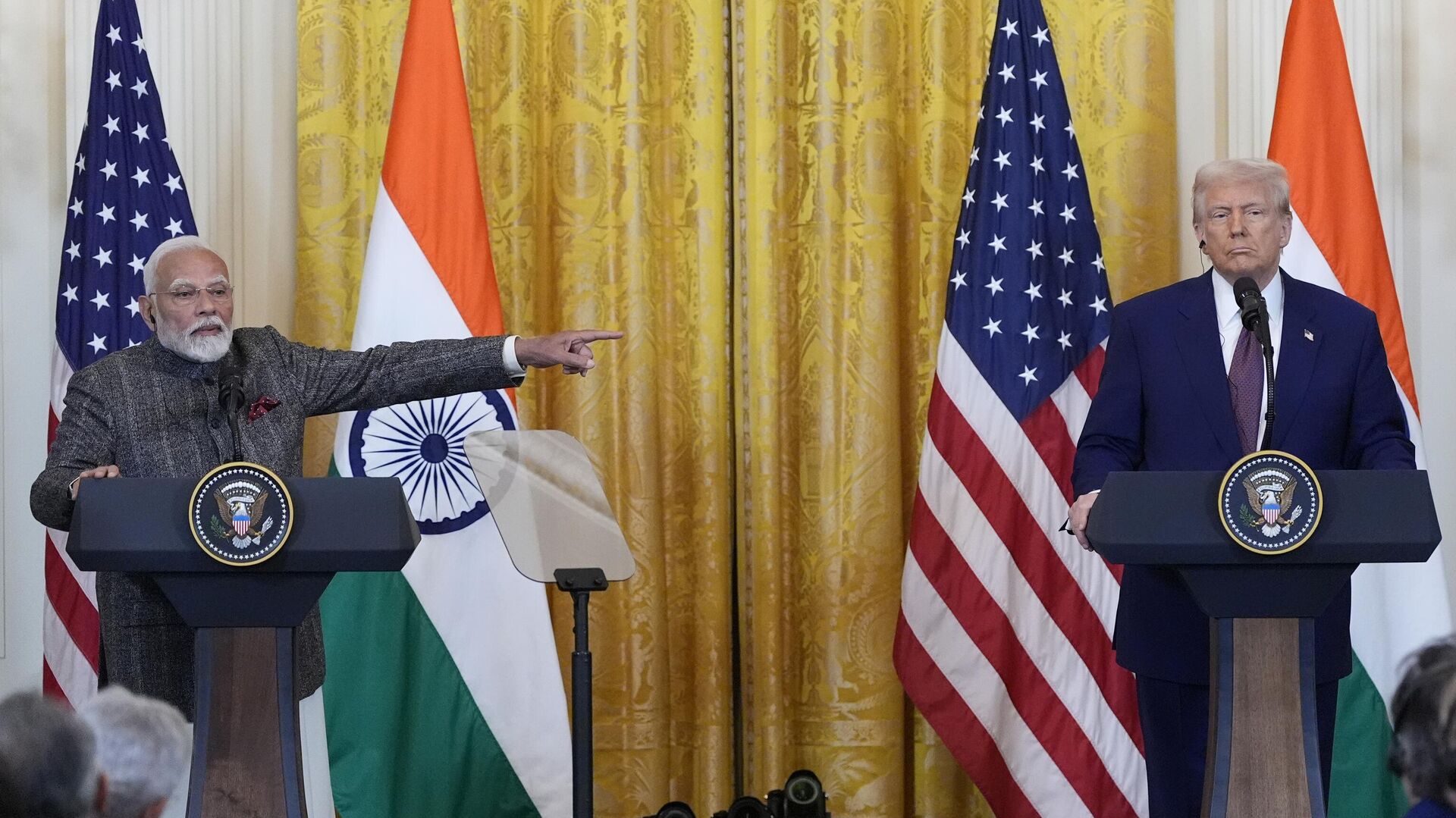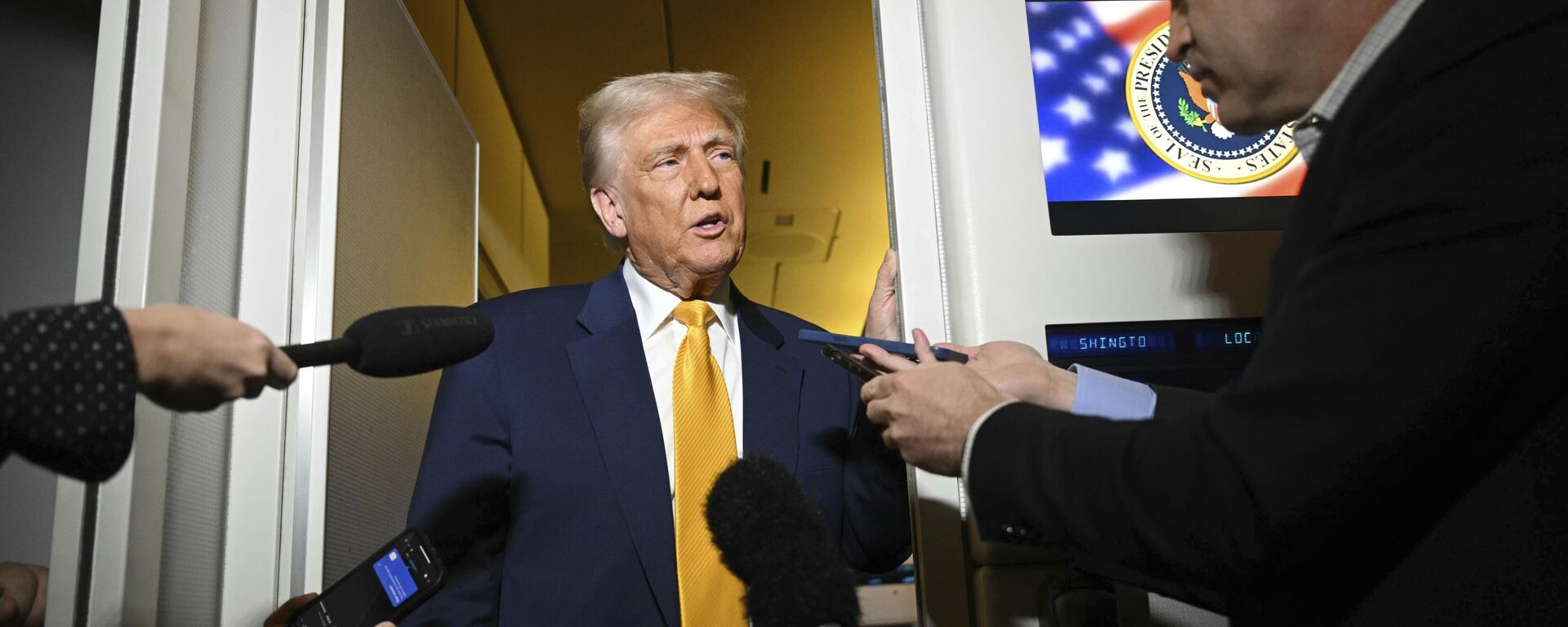India Strongly Rejects Trump's Mediation Offer on Kashmir
18:53 13.05.2025 (Updated: 20:53 13.05.2025)

© AP Photo / Alex Brandon
Subscribe
While Pakistan's Foreign Ministry has welcomed Trump's mediation efforts to resolve the Kashmir issue, India has strongly pushed back against any external interference in the matter, which it has described as a bilateral matter.
India has firmly rejected the US President Donald Trump's mediation offer on Jammu and Kashmir issue, describing it as a bilateral issue between India and Pakistan.
"We have a long-standing national position that any issues pertaining to the Union Territory of Jammu and Kashmir have to be addressed by India and Pakistan bilaterally. That stated policy has not changed. The outstanding matter is the vacation of illegally occupied Indian territory by Pakistan," Ministry of External Affairs (MEA) Spokesperson Randhir Jaiswal told a weekly briefing in New Delhi on Tuesday.
🚨BREAKING: India REJECTS 🇺🇸Trump’s mediation offer on Kashmir - 🇮🇳MEA
— Sputnik India (@Sputnik_India) May 13, 2025
भारत ने कश्मीर पर ट्रम्प के मध्यस्थता प्रस्ताव को अस्वीकार किया https://t.co/0V4RhrPg1d pic.twitter.com/N3MC2Q7BXK
In a social media post on 10 May, Trump stated that he would work with both India and Pakistan to negotiate a "solution" to the Kashmir issue. He referred to the Jammu and Kashmir matter as one that has been ongoing for a "thousand years," despite the territorial dispute emerging only in 1948 following the Independence of the Subcontinent.
The MEA spokesperson also rejected Trump's assertion that the US had helped to avoid a "nuclear war" between India and Pakistan by using trade as a weapon.
"The military action from our side was entirely in the conventional domain...There were some reports, however, that Pakistan National Command Authority will meet on 10th May but this was later denied by them. Pakistan's Foreign Minister (Ishaq Dar) has himself denied the nuclear angle on record," Jaiswal said.
The MEA spokesperson said that India would never give in to "nuclear blackmail or allow cross-border terrorism to be conducted invoking it".
"In conversations with various countries, we have also cautioned that their subscribing to such scenarios could hurt them in their own region," Jaiswal stated.
The MEA spokesperson also refused to confirm a statement by US Secretary of State Marco Rubio on 10 May, wherein Rubio announced that the Governments of India and Pakistan had agreed to an "immediate ceasefire (starting 10 May)" and to start talks on a broad range of issues at a "neutral site".
Reiterating Prime Minister Narendra Modi's comment, Jaiswal said any prospective India-Pakistan talks would only involve discussion on cross-border terrorism and the vacation of "illegally occupied" territory of Jammu and Kashmir (Pakistan-administered Kashmir). He added that the various countries, including the US, had been briefed on India's position in recent weeks.
Jaiswal explained that Pakistan approached India for ceasefire talks only after a "devastating Indian counter-response", which was delivered after Pakistan launched an aerial assault across the border in the wake of Operation Sindoor on 7 May. Under Operation Sindoor, India launched pre-dawn precision strikes at nine terrorist hideouts and training camps in Pakistan. PM Modi has said that Indian precison strikes, launched in response to the Pahalgam terrorist attack on 22 April, had left over 100 terrorists dead.
"As a result of Operation Sindoor, Pakistan has seen its terrorism centres in Bahawalpur, Muridke, Muzaffarabad and other places destroyed. Thereafter, its military capabilities were significantly degraded by us and key airbases effectively put out of action," Jaiswal told the briefing.
He added that if Pakistani military had "stayed out" after Indian counter-terror strikes, there wouldn't have been any counter-response by the Indian Air Force (IAF), Indian Army and Indian Navy.
"If they fired on us, we would respond suitably. Till the night of 9th May, Pakistan was threatening India with a massive assault. Once their attempt failed on 10th May morning and they received a devastating Indian counter-response, their tune changed," Jaiswal recalled the events between 7 and 10 May, when the ceasefire was finally announced.
Jaiswal also said that India would be sharing information with the United Nations Security Council (UNSC) in coming days with regards to the cross-border linkages to the Pahalgam terrorist attack. A meeting of the UNSC 1267 Sanctions Committee is scheduled to take place this week.
"You would have seen that TRF had taken responsibility, and on the second day, twice they had taken responsibility. Thereafter, possibly at the behest of their handlers, they rolled it back. But TRF is one organisation which is a front of the Lashkar-e-Taiba (LeT)*. We have been pursuing listing of TRF by the UNSC 1267 Sanctions Committee," the MEA Spokesperson said.
*banned terrorist group


